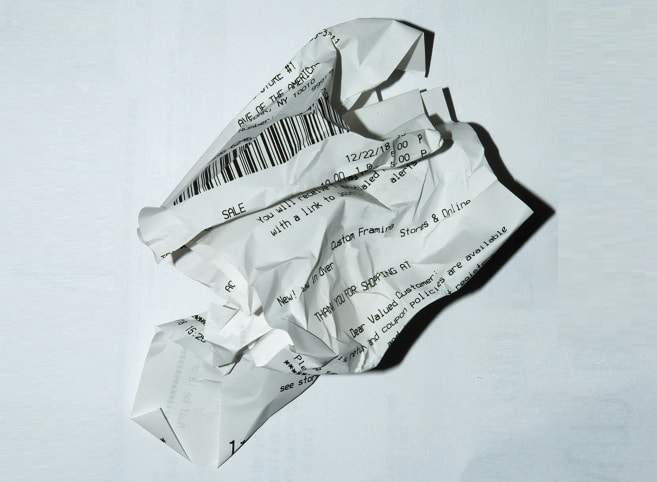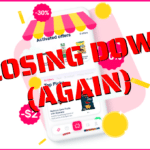
Five years after a California lawmaker proposed what could have become the country’s first law aimed at phasing out paper receipts, two other states are now proposing similar measures – but one of them goes much further. Instead of requiring that receipts be printed only upon request, as the others do, this proposal would ban paper receipts – and any “associated coupons” – altogether.
That bill is currently under consideration in New Jersey, where the state’s new legislative session began last month. Democratic state Assemblymen Herbert Conaway, James Kennedy and Clinton Calabrese have introduced what they’re calling the “Paper Receipt Reduction Act.” Its main focus is to ban the use of “potentially toxic paper receipts” by prohibiting printed receipts containing bisphenol-A or bisphenol-S, which it says most currently do. So effective within 45 days of the bill becoming law, paper receipts containing either chemical would be banned.
But that’s just the beginning. Within a year, the measure would also ban all paper receipts outright, along with any associated paper coupons. There are no exceptions, no provisions for small businesses that aren’t set up to offer electronic receipts, no stipulation that paper receipts will be available upon request, just a blanket ban. “No retailer or service provider shall provide a consumer with, or shall use for any other purpose, a receipt or other business or banking record, or any associated coupon or advertisement, that is printed on paper,” the bill reads.
That’s in contrast to another newly-introduced bill in New York. That measure, as proposed by Democratic state Senator Peter Harckham, would ban retailers from automatically printing paper receipts, unless a customer asks for one.
In his version of what he called the “Skip the Slip” bill, Democratic state Assemblyman Phil Ting of California similarly called for businesses to be banned from providing paper receipts except upon request. His measure, first introduced in 2019 and again last year, would also have prohibited any paper receipt that is requested “from including items not essential to the transaction, including, but not limited to, coupons or advertisements.”
So Ting’s bill, which did not ultimately become law, fell somewhere in between the two new proposals. New York would ensure businesses only print paper receipts upon request, and it says nothing about coupons. New Jersey would ban all paper receipts, and “associated” coupons, with no exceptions.
Left unsaid is what exactly constitutes an “associated” coupon. Is it limited to coupons printed at the bottom of your receipt, like at CVS, or coupons and ads printed on the back of your receipt? Does it impact Catalina coupons that are printed at the checkout alongside, but separately from, a paper receipt? Or could “any associated coupon or advertisement that is printed on paper” be read to mean any in-store paper coupon or ad provided by a retailer, like blinkie and tearpad coupons, or printed weekly circulars? At this stage, it’s still unclear.
The New Jersey bill echoes Ting’s original proposal, in advocating for the elimination of paper receipts out of concern for the environment. Both cite research from the environmental group Green America, which found that the U.S. uses more than 3 million trees and 10 billion gallons of water to create paper receipts every year, generating more than 300 million pounds of waste and four billion pounds of carbon dioxide.
“Paper receipts are not a necessary item, and the continued use of these receipts has significant negative impacts both on the environment and on public health,” the bill reads.
But Ting’s proposal, while well-meaning, faced plenty of pushback. Several retail groups pointed out that many small businesses don’t have the ability to provide e-receipts, while others don’t want the responsibility of collecting and securing customers’ email addresses in order to send them receipts. And restricting printed coupons and ads “raises constitutional questions” as a “limit of commercial speech,” a coalition of retail groups argued, calling that provision “anti-consumer.”
New Jersey’s blanket ban could raise even more issues. It would make it difficult, or impossible, for shoppers in the state to take advantage of rebate apps that require scans of physical receipts. And it could raise the specter of “digital discrimination,” as low-income or elderly shoppers who don’t have the means or the know-how to receive or access digital receipts, may end up getting no receipts at all. Then they won’t be able to prove their purchase at a receipt check when leaving a store, or when attempting to return an item later.
And if the measure is to be interpreted as pertaining to all paper coupons and ads, discussion about this bill could go right back to where we are in the debate over paper versus digital coupons. That debate also originated in New Jersey, when a lawmaker there proposed last year that all stores offer paper coupon equivalents of all digital coupons.
This time, when it comes to the receipt bill, New Jersey lawmakers aren’t considering whether to force retailers to offer more paper, but less. It will be up to their fellow legislators, and the state’s governor, to determine whether the latest state to propose a ban on printed receipts will become the first state to pass it into law – or whether, just like millions of paper receipts, this measure ends up unwanted, forgotten, and tossed out.
Image source: Michael Walter on Unsplash














So I’d like to know if the receipt can be emailed to you? How are returns going to work? If I have a storage unit for a business or a receipt for gas to be reimbursed, how do I do that. What about business office supplies? Will the irs accept that you have no receipts to back up a deduction?
I guess when you’re on capital hill and don’t work, you don’t think about things like this.